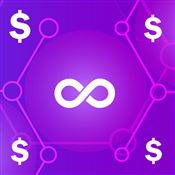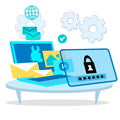Is a VPN Worth It?
A VPN protects your online privacy. But they can be expensive. Is it a waste of money? Find out just the pros and cons and what can still be tracked.
 |
Unfortunately, nothing we do online is private. But a VPN can help protect your online activities and reclaim your privacy.
However, VPNs aren't super-cheap. And the best deals usually require a bigger upfront payment and long-term commitment.
So is a VPN worth the price? Read on to find out.
Bottom Line: If you are concerned about keeping your information and online activities private, then paying for a high-quality VPN is worth it. A VPN protects you from hackers and cyberthreats. In addition, you can safely stream, torrent, and access geo-blocked websites.
What Does a VPN Do?
A virtual private network (VPN) is an internet security tool. It does two things:
- Encrypts your data so nobody can see what sites you're visiting and the information you're sending.
- Changes your IP address so your location is hidden. You appear to be from a different location.
Hackers and/or spies won't know who or where you are or what you do online. Even if someone hacks your connection, they can't see your data or real location.
5 Reasons a VPN Is Worth It
 |
A VPN is an essential tool for internet security. Here are some good reasons to use a VPN.
Pro #1. Keep Your Online Activities Private
Think about all the things you share online on a daily basis - your passwords, bank account logins, credit card numbers, and all sorts of other personal information.
When you're using the web, a lot of parties are spying on you and tracking everything you do - from your internet service provider to search engine to site cookies. Your ISP is even allowed to sell that information to third parties.
When using a VPN, all your web traffic is encrypted. No one can see what you're doing online. Your ISP will only see that you're on a VPN, not what you're doing. Even someone spying on you will just see a bunch of mumbo-jumbo.
Whether you're logging into your bank accounts, streaming, or doing Google searches, your activities remain private.
Pro #2. Stay Safe When Using Public Wi-Fi
You might use a coffee shop's Wi-Fi while enjoying a cuppa. Or an airport Wi-Fi while waiting out a layover. Most of us do this without thinking twice. But just how safe is the Wi-Fi network?
Unsecured public Wi-Fi makes for an easy target for hackers to intercept data and steal your information. It's best to avoid them entirely, but sometimes you have no choice. In this case, a VPN protects you by encrypting your data. You won't need to worry about using an unsafe Wi-Fi.
Your home network is a lot safer than a public Wi-Fi, but using a VPN still has a lot of benefits. It will stop your ISP from tracking your online activity, so you can browse anonymously. Plus, it provides an extra layer of security.
Pro #3. Access Geo-Blocked Sites
Traveling in another country and need to bypass censorship? Want to watch Netflix in another country? Or play a region-locked game?
A VPN service lets you log into servers in other countries, so it looks like you're in another country. So for instance, you can log into a Japan server and get access to their streaming content. Or if you're out of the country, you can still watch your streaming services from your home country.
If you're traveling to a country with censorship laws, a VPN is a must to get past firewalls. In China, things like Google, Facebook, Instagram, etc. are all blocked. A VPN gives you online freedom and will let you stay in touch with the outside world.
Pro #4. Torrent Anonymously
Peer-to-peer (P2P) file sharing is a popular way of sharing files. Many people use it to share free-access data. This includes open-source software, public domain videos, and other large files.
However, anyone downloading or uploading the same files as you can see your IP address. In fact, all users' IP addresses are open and public.
In addition, some countries have rules against torrenting. Or your ISP may be notified if they sense you're infringing on copyright laws, and could even cut off your service.
Using a VPN will hide your real IP address so no one can see where you are. Torrenting activities won't be traced back to you. It also hides the fact that you are torrenting from your ISP, so you can torrent anonymously.
Pro #5. Avoid Cyberthreats
A lot of VPNs (like NordVPN) have blockers that block access to websites known for malware, phishing scams, and other cyberthreats.
These kinds of harmful websites are used by hackers to damage computers and steal personal data. Worse, a lot of the time, you're not even aware that you're infected, so the malware can be on your computer for a long time secretly spying on you and stealing your info.
A VPN will cut down the risk by protecting you from these kinds of websites.
4 Downsides of VPNs
 |
While the pros far outweigh the cons, here are some downsides to be aware of.
Con #1. Doesn't Protect You from Everything
A VPN only keeps you protected while you're using one. If your bank or another website is hacked, then any information you have shared will still be at risk. If you're hacked because you have a weak password, a VPN can't do anything to help.
A VPN also can't protect you from viruses. If you open an attachment with a virus, a VPN can't stop it from infecting your device. You will need an anti-virus software for total protection.
So it's still important that you practice good computer security habits.
Con #2. Slower Speeds
Since a VPN encrypts your internet traffic, this slows down your speed. And plus, if you connect to a server around the world, the distance will also affect speed. This can be frustrating if you're trying to stream or play a game.
This is truer with free or poor-quality VPNs. If speed is something particularly important to you, look for a provider with reliable high connection speeds, like ExpressVPN.
Con #3. Not All Unblock Streaming Sites
Streaming services like Netflix often block VPN servers because they don't want people being able to bypass regional licensing restrictions. Netflix actively blocks IPs belonging to VPN servers.
Unfortunately, this is an ongoing battle between Netflix and VPN companies. But there are a handful of providers known to get around the bans. If you want to access a particular streaming service, make sure you use a high-quality VPN service that works with it.
NordVPN has been consistently reliable for being able to stream Netflix, Hulu, and Amazon Prime Video.
Con #4. Not All Have Strong Privacy Laws
A VPN company has to follow the laws of the country they're in. Most premium VPN services operate out of the "Five Eyes" countries and have strong privacy laws. This way, they can maintain a no-logs policy.
But certain countries have data retention laws. If a VPN provider is in one of these countries, it's subject to these laws. These countries could force a VPN company to give up user data logs. Pay attention to where the VPN is headquartered and its privacy policy terms.
How Much Does a VPN Cost?
You may be wondering just how much you'll pay for privacy.
While VPNs aren't super cheap, they're not that expensive either. Usually, you can choose to pay month-to-month (which will be most expensive) or longer subscriptions. The longer the subscription, the steeper the discount. But you'll have to pay a larger amount upfront.
For just the price of a coffee per month, a VPN is an affordable solution to keep you safe online.
Is a Free VPN Good Enough?
There are a number of free VPN services. If you only need a VPN temporarily, you may be tempted to just get a free VPN. But be careful with those. In general, "you get what you pay for" is true with VPN services.
Free VPNs often don't provide proper protection. Some free VPNs still log your data, which defeats the purpose of a VPN. They need to make money from somewhere, so they may even sell user data to third parties.
Plus, they usually have bandwidth limits and slow speeds. You can only connect one device and you may only get one server choice. Free services also have limited functions (such as not being able to stream or P2P file share). It's much better to pay for a reliable VPN service.
If you really don't want to pay, your best option is to use a premium VPN provider with a free option. ProtonVPN offers a free plan with unlimited data but slower speeds. Hotspot Shield has a free VPN plan with a 500 MB daily data limit. Both make money from their paid plans, so you can trust their privacy policies.
Best VPNs to Consider
Here are some of our top recommended VPNs. All these have strong military-grade encryption and strict no-logs policy.
ExpressVPN
ExpressVPN is one of the best VPNs available. Based in the Virgin Islands, it has 3,000+ servers in 94 countries. The pricing is a little more expensive than others, but it's known for reliability and high speeds.
It supports torrenting, streaming, and can bypass China's restrictions. It also has a split tunneling feature that allows you to choose what app traffic to route through the encrypted VPN. You can connect 5 devices at the same time.
Get ExpressVPN
NordVPN
Based in Panama, NordVPN is the all-around best VPN in terms of price, security features, and speed. It has 5,500+ servers in over 59 countries.
NordVPN is feature-rich. It supports streaming, P2P, and TOR. In addition, there's a Double VPN option that encrypts your traffic through 2 VPN servers for double security. You can also set up a dedicated IP address.
If you choose one of the longer subscriptions, NordVPN's pricing is excellent and beats out many competitors. All plans have a 30-day money-back guarantee.
Private Internet Access (PIA)
Private Internet Access is one of the cheaper VPN services. In particular, the month-to-month plan is cheaper than other competitors.
It boasts the largest network, with 12,945+ servers in 75 countries. It supports P2P and blocks malware. However, it's known to not work for Netflix streaming. You get up to 10 connections.
PureVPN
PureVPN owns a self-managed network of 6,500+ servers in 140+ countries. In comparison, other VPN providers might be using shared servers from 3rd party providers.
Surfshark
Surfshark, based in the British Virgin Islands, has 1,700+ servers located in more than 60 countries.
You can also stream Netflix in 15 countries, which is more than many other VPN services.
It offers the lowest monthly price with a 24-month subscription at just $2.49/mo. You can protect an unlimited number of devices, so it's great for families.
What the Experts Say
CreditDonkey asked a panel of industry experts to answer readers' most pressing questions. Here's what they said:
Bottom Line: Is a VPN Worth It?
For anyone concerned about internet security, a VPN is a must. VPNs help you reclaim privacy and get back online freedom. You can browse, stream, chat, and do banking knowing that you're protected. For just a few bucks a month, you can have peace of mind that your information is secure.
For the best protection and most comprehensive features, it's worth it to pay for a premium VPN service. If you're just a casual internet browser and really don't want to pay, then at least go for a free plan under a reputable premium provider.
Anna G is a research director at CreditDonkey, a internet comparison and reviews website. Write to Anna G at feedback@creditdonkey.com. Follow us on Twitter and Facebook for our latest posts.
Note: This website is made possible through financial relationships with some of the products and services mentioned on this site. We may receive compensation if you shop through links in our content. You do not have to use our links, but you help support CreditDonkey if you do.
Read Next:







